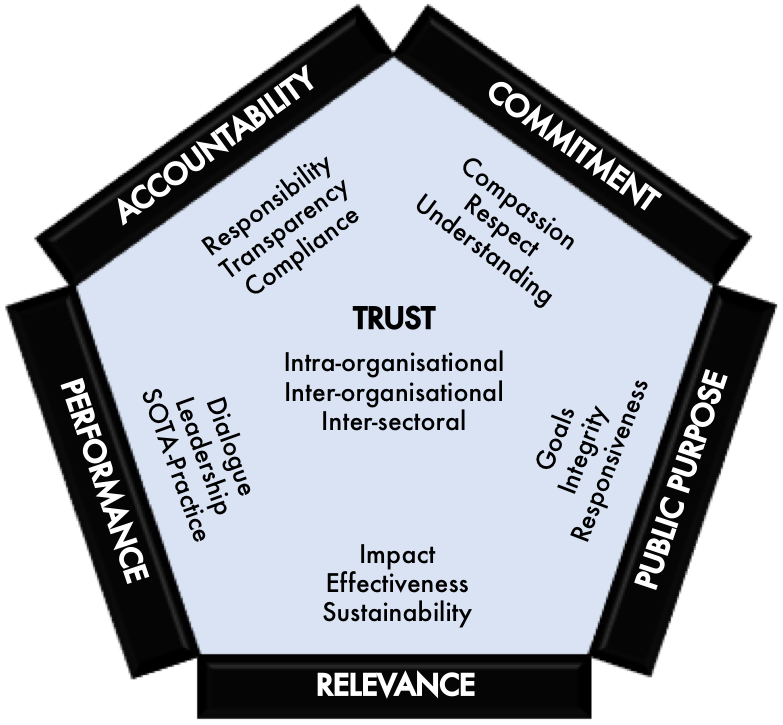The Means at Hand
Trust-driven practice strengthens the value-base of philanthropic organisations
By Timo Unger.
Recently, Beth Breeze remarked that – what she called – the “philanthropic impulse” needs to be safeguarded against increasing criticism. Breeze announced she will be taking care of articulating and defending the values of philanthropy in her upcoming book. We can only applaud this approach, but would also emphasise the fundamental contribution of trust-driven practice that the Philanthropy.Insight Assessment Tool (PIAT) proposed by the Maecenata Foundation brings to the table. While philanthropic organisations often exhibit quite a diverse range of values, they show only minor effort in institutionalising relevant practices. This paper argues that philanthropic organisations already have the means at hand to articulate and defend themselves and their values – by building and extending trust in their practice.
Why Trust matters
For most philanthropies, trust has not been a major concern. How could doing good be met with distrust? Although philanthropic organisations have provided substantial means in times of crisis, the pandemic has provoked a growing public awareness of social inequalities and the dependencies in which philanthropic practice is embedded. Against the backdrop of exploding donations from some individuals, their loud voices and visible actions were not only regarded with distrust, but in some cases turned out to be fuel for profound conspiracy. Like anywhere else, Covid-19 reveals existing tensions and complexities in the philanthropic sector. However, already way before the pandemic, philanthropy came under criticism for its lack of transparency and accountability in many parts of the world. As a lack of trust corrodes their credibility and undermines their purposes, the resource trust appears as a fundamental value towards which philanthropies should align their practice.
Trust-driven philanthropic practice is key

PIAT builds on trust as a fundamental value of philanthropy and is designed to strengthen this value-base of philanthropic organisations. Conceptually, PIAT takes recourse to two central forms of trust, trust in intentions and trust in competence. According to Bart Nooteboom, the former concerns the awareness of an “absence of opportunism”, whereas the latter implies to “conform to expectations”. PIAT operationalises both forms of trust into five criteria and, conscious of the challenge of achieving a common understanding, the criteria are accompanied by a set of guiding questions to facilitate a shared understanding across diverging cultural contexts.
Three criteria of the tool are dedicated to reflecting Trusts in Intentions. By putting emphasis on the very essence of philanthropy – being empathetic – Commitment addresses questions regarding how a philanthropic organisation’s action takes the voice of its ultimate customers, i.e. the beneficiaries, into account. Public Purpose underlines that philanthropic activity must be tailored around creating public value. Its focus lies on the degree to which philanthropic organisations are driven by public demand, the stakeholders involved, and standards of integrity adopted. Relevance raises questions on the characteristics of philanthropic activities: it questions among other things whether mechanisms are in place to provide sustainable and impactful action for the beneficiaries.
The two remaining criteria guide us through a process that reflects Trust in Competence. Performance embodies the internal and external postures of a philanthropic organisation; its questions include the extent to which leadership is mindful and adaptive, how far strategic management practices reach, and in what way the organisation makes sure to operate on level playing fields with others. Accountability accentuates the organisation’s consciousness as an actor of civil society. It questions among other things how and to which effect organisations comply with due diligence principles on responsibility and transparency.
Dimensions of a trust-driven mode of philanthropic practice
By following PIAT, philanthropic organisations have the means at hand to evaluate their current approaches, identify areas of improvement, and extend knowledge and/or capacity to redirect trust in the respective dimensions.
Philanthropic organisations do not operate in a vacuum. They interact with multiple stakeholders in complex environments inside and beyond the philanthropic ecosystem. Trust-driven philanthropic practice addresses three dimensions of trust. Intra-organisational trust links to trust within the philanthropic organisation. It applies to the relationships between managing and operating levels of philanthropic organisations, as well as to the relationship between leadership and employees and among staff. Inter-organisational trust addresses the interplay between philanthropic organisations and actors of the philanthropic ecosystem. This holds not only true for the relationships between donors and grantees, and eventually beneficiaries, but also those between other philanthropic organisations. Lastly, inter-sectoral trust refers to relations of philanthropic organisations beyond the philanthropic ecosystem with corporate or government actors, but also with the public at large.
By following PIAT, philanthropic organisations have the means at hand to evaluate their current approaches, identify areas of improvement, and extend knowledge and/or capacity to redirect trust in the respective dimensions. As has been outlined, PIAT does neither promise to be a linear process nor to offer a final product, not to mention a one-size-fits-all solution. It is an invitation for philanthropic organisations to apply the trust lens to their current strategies and programmes to ultimately become better at what they are doing.
If taken seriously, this effort should be an ongoing process in philanthropic organisations composed of learning, including from failures, experimentation of practices and dialogue with stakeholders. Externally articulating the defence of the philanthropic impulse might be worthwhile for a balanced and nuanced discourse. At the end of the day, however, it is the philanthropic practice that matters above all.
Timo Unger is a Master of Public Policy Student at the Hertie School Berlin and Research Assistant at the Maecenata Foundation.
The Philanthropy.Insight project is organised by the Tocqueville Forum of the Maecenata Foundation and receives support from the Carnegie UK Trust and the Fundação Calouste Gulbenkian.
